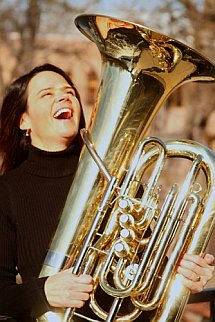 Deanna Swoboda first came to national prominence as tubist with the Dallas Brass. Her rock solid time and sensitive phrasing seemed effortless as she anchored the world-famous brass. Swoboda subsequently served on the music faculty of Western Michigan University and has recently accepted a faculty position at Arizona State University.
Deanna Swoboda first came to national prominence as tubist with the Dallas Brass. Her rock solid time and sensitive phrasing seemed effortless as she anchored the world-famous brass. Swoboda subsequently served on the music faculty of Western Michigan University and has recently accepted a faculty position at Arizona State University.
A gifted speaker and educator, she has performed numerous clinics and masterclasses. Swoboda is articulate when speaking about her instrument, and a virtuoso when performing on it.
Perhaps no tuba player since Bill Bell has possessed a greater vision of the tuba as a popular solo instrument than Swoboda, who excels at combining the spoken word and captivating narratives with music for tuba.
davidbrubeck.com has launched a new interview series featuring tuba and euphonium artists, “The 4th Valve”, in celebration of the anniversary of our initial publication in the (then) TUBA journal, an interview with the originator of the tuba/euphonium quartet-Connie Weldon.
We are delighted to host the visionary and talented Professor Swoboda as the first interview for the first installment of “The Fourth Valve” tm.
1. How do you conceive of, describe or imagine the ideal tuba sound?
Having a concept of sound is very important. We can develop our concept of sound by listening to live performances and to recordings. Imagining and imitating is a great way to begin developing a sound. Know what you want to sound like every time you sit down to play. I like to imagine a tuba sound as clear, warm, pure, resonant, with core in the middle.
2. How do you achieve more musical expression?
One way to achieve more musical expression is by listening to a lot of music, and listening to different styles of music. Someone said to me one time, “be careful what you listen to, because what you put into your ears and into your mind, will always be there to some degreeâ€. Put high quality sounds and high quality thoughts into your ears and mind so that you can achieve high quality sounds through your instrument.†Another way to work on musical expression is learning how to move your body with the music. Working away from the instrument, using arm, facial, and body gestures to express the music is quite effective. When taken back to the instrument, it is often easier to express the musical idea.
 3. Name two types of inspirations:
3. Name two types of inspirations:
Musical – Recently, Take 6, the vocal group. They are the masters of tight rhythm, tight harmonies, and musicality. Great live performance!
Non-musical – The gift of life and everything in it. Every day is another opportunity to wake up, be grateful, and give back to the world.
4. What was your typical warm-up routine like as an undergrad?
As an undergrad, I didn’t really have “a routineâ€. I played some long tones, some scales, lip slurs and was ready to go. As a graduate student, I began to realize how important “the basics†are to our lifelong development on the instrument. The more time that I spent playing scales, lip slurs, long tones, the more I improved and the easier it was to learn new music. I also believe that the more music that we learn, and the more diverse the styles we play, the more we develop our musicianship and our ability to interpret music.
As a touring musician, my routine became sacred. That is the only practice I would get, typically. I would buzz my mouthpiece a lot, play basics in my hotel room (typically with a mute) and then go to the concert hall for a sound check or to present a master class. Practice time on the road is challenging. It was sometimes possible to find a room at a nearby school or church to practice. But, most of my heavy practice was done at home, before the tour would begin and then I did a lot of “maintenance†on the road. I always looked forward to getting home, so I could practice and learn new material.
Now, as a university professor, I can organize my schedule to accommodate my practice. Practice time in sacred. I put it into my daily schedule, as if it’s a class I teach. I block out 2-3 hours every morning for my personal practice. I believe it is important to be a musician first, before teaching and helping my students improve their musicianship, it’s important that I am firmly rooted in my own music making. At that point, I feel more connected to everything I do, on the instrument, and with my students.
5. What one sentence, or so, comes to mind when you think of:
Bill Bell:
When I think of Bill Bell, I think of a great musician and an inspiration to everyone. He was the first person to bring more prominence to the tuba, giving it more of a solo voice and creating more of a active role for freelance tuba players.
Connie Weldon:
I consider to be the first prominent woman tuba player as a soloist, a professor, and as an orchestral player. Connie was a master teacher and integral to the development of the tuba euphonium ensemble, generating new repertoire for that genre.
Arnold Jacobs:
When I think of Arnold Jacobs, I think “Song and Windâ€. Thinking about Mr. Jacobs and the two lessons I had with him, I am always reminded of “the ease of playing the tuba†and about “being a singer on the instrumentâ€.
Harvey Phillips:
A great human being. And, the amount or music he generated for the tuba and euphonium. His dedication to improving the instrument and the repertoire for the instrument is unprecedented. Harvey Phillips was key in establishing T.U.B.A., what we know today as ITEA, an organization dedicated to improving tuba euphonium instruments, generating new music and providing an outlet for players to come together, to perform, and to be inspired.
Winston Morris:
Winston Morris is a genuine, kind, full spirited human being. He is passionate about everything he does. He is passionate about the tuba, about teaching, about his students, about life.
6. How do you view the role of the tuba in a brass quintet? What are the challenges? The delights?
The role of the tuba in a brass quintet is to provide the foundation of time, rhythm, tuning, articulation, and tone. Everyone in the quintet, being aware or not, depends on the tuba for strong fundamental playing, something they can sit on and build upon. For me, the challenges have included being able to play as delicate and soft as the trumpets. In addition, the brass quintet repertoire is some of the most challenging repertoire I have ever played and it has pushed me to reach new musical heights. My favorite part of quintet it melting the sounds together, “flying in formationâ€, sounding like one person playing 5 instruments! Oh so fun!!
7. How do you imagine the tuba in the future, any new roles or types of music?
Our instruments will continually improve, with better response, better valve mechanisms, more ergonomic. I don’t like to think less about the evolution of the tuba, and more about where we, as musicians, can take our musicianship with a tuba in our hands. Our goal should be to improve overall musicianship, so that people forget it’s a tuba we’re playing – to equal that of an electric guitar, or a solo violin.
8. What is the best tuba playing you have ever heard?
I can’t identify the best tuba playing I’ve ever heard because I am continually inspired by ALL tuba playing and ALL tuba players! When listening to a recording or listening to someone perform live, I always learn something new, something that will inspire my own playing in a positive way.
9. What is the best tuba playing you have ever done?
I am a student for life and cannot honestly talk about the best tuba playing I’ve ever done. Everyday is a new beginning and we are only as good as our last performance. I can tell you though, that I am blessed to have had such a vibrant and interesting performing career. Performances range from performing concerts with Dallas Brass, tons of educational performances (rapping and acting), performing solo with the US Army Orchestra. Traveling the world and seeing places I never thought I would see; Europe, Russia, China, and all 50 US states. I am grateful to be a musician.
http://www.youtube.com/watch?v=b2iNzJv0tc8
c. 2013 David William Brubeck All Rights Reserved davidbrubeck.com
Interested in more “The Fourth Valve” tm Interviews?
Don Harry
John Stevens
Jim Self
John Van Houten
Demondrae Thurman
Deanna Swoboda
R. Winston Morris
Beth Wiese
Aaron Tindall
Marty Erickson
Beth Mitchell
Chitate Kagawa
Aaron McCalla
Images appear courtesy of deannaswoboda.com

